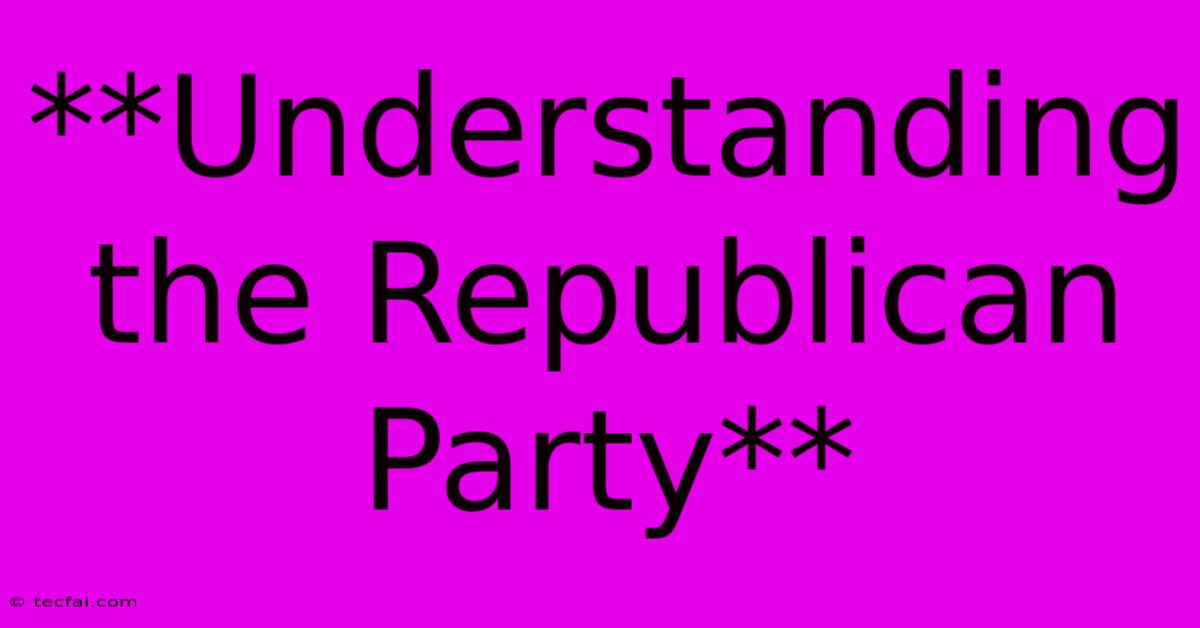**Understanding The Republican Party**

Discover more detailed and exciting information on our website. Click the link below to start your adventure: Visit Best Website tecfai.com. Don't miss out!
Table of Contents
Understanding the Republican Party: Core Beliefs, History, and Impact
The Republican Party, one of the two major political parties in the United States, has a long and complex history, shaping the country's political landscape for over 150 years. To understand its current role and impact, it's essential to delve into its core beliefs, historical trajectory, and key figures.
Republican Party Beliefs: A Spectrum of Conservatism
While individual Republicans may hold diverse views, the party broadly aligns with conservative ideologies. These core beliefs include:
- Limited Government: Republicans generally advocate for a smaller role of government in the economy and individuals' lives. They prioritize free markets, individual liberty, and limited government intervention.
- Fiscal Conservatism: The party champions balanced budgets, lower taxes, and a reduced national debt. They often support policies promoting economic growth and deregulation.
- Social Conservatism: Republicans tend to support traditional values, including opposition to abortion, same-sex marriage, and drug legalization. They prioritize family values and religious freedom.
- Strong National Defense: The party emphasizes a strong military presence and active foreign policy to protect national security and promote American interests abroad.
A Historical Overview: From Lincoln to the Present
The Republican Party was founded in 1854, primarily to oppose the expansion of slavery. Abraham Lincoln, the party's first president, led the nation through the Civil War and played a pivotal role in ending slavery. Since then, the party has undergone various transformations, adapting to evolving political and social landscapes.
Key Moments in Republican History:
- The Progressive Era: Early 20th-century Republicans embraced progressive reforms, advocating for women's suffrage, labor regulations, and anti-trust laws.
- The New Deal Era: The Great Depression saw a shift in ideology, with Republicans largely opposing President Franklin D. Roosevelt's social welfare programs.
- The Civil Rights Movement: The party's stance on civil rights was complex, with some advocating for desegregation and others supporting segregationist policies.
- The Reagan Revolution: Ronald Reagan's presidency (1981-1989) marked a significant shift toward conservative policies, emphasizing economic deregulation, tax cuts, and a strong national defense.
- The Rise of Trump: Donald Trump's presidency (2017-2021) further polarized the party, with his populist rhetoric and unconventional style challenging traditional Republican norms.
Impact and Influence: Shaping the American Landscape
The Republican Party has had a profound impact on American politics and society. Its policies have shaped the nation's economic landscape, social fabric, and foreign policy.
Some key areas of influence:
- Economic Policy: Republican policies often focus on deregulation, tax cuts, and limited government spending, with a focus on promoting economic growth and individual initiative.
- Social Policy: The party's stance on social issues has contributed to debates around abortion, same-sex marriage, gun control, and education.
- Foreign Policy: Republicans generally support a strong military presence and active foreign policy, emphasizing national security and American leadership on the world stage.
Conclusion: Understanding the Complexity
Understanding the Republican Party requires acknowledging the diverse perspectives within its ranks. While it broadly adheres to conservative ideologies, it also exhibits internal divisions on issues like immigration, climate change, and the role of government.
The party's future direction remains uncertain, but its continued influence on American politics and society is undeniable. As the nation faces evolving challenges, the Republican Party's role in shaping the future will continue to be a subject of ongoing discussion and debate.

Thank you for visiting our website wich cover about **Understanding The Republican Party**. We hope the information provided has been useful to you. Feel free to contact us if you have any questions or need further assistance. See you next time and dont miss to bookmark.
Featured Posts
-
Usf Beach Volleyball Moves To Conference Usa
Nov 06, 2024
-
Was It Real Melania At The Polls
Nov 06, 2024
-
Lto Aksyon Sa 7 Plate Suv
Nov 06, 2024
-
Jd Vance Trump Mourns Elon Musk Squirrel
Nov 06, 2024
-
Embiid Altercation Highlights Sports Journalism Needs
Nov 06, 2024
